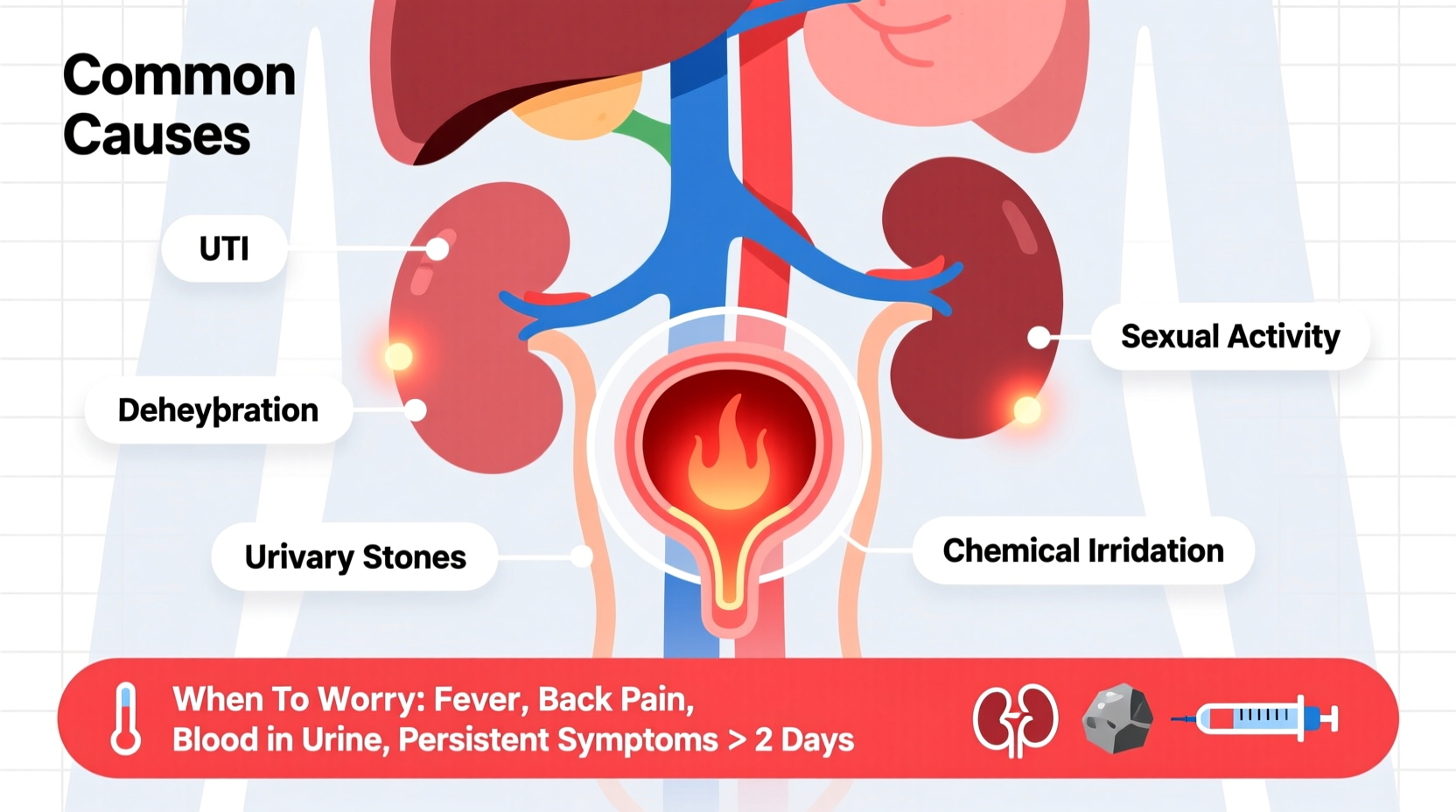Many people experience the uncomfortable sensation of hot or burning urine at some point in their lives. While it can be alarming, this symptom is often linked to manageable conditions. However, in some cases, it may signal an underlying infection or health issue that requires prompt medical evaluation. Understanding the root causes, associated symptoms, and warning signs helps you make informed decisions about when to seek help.
Common Causes of Hot-Sensation Urine

The feeling of hot or burning urine typically arises from irritation or inflammation in the urinary tract. The most frequent culprits include infections, chemical irritants, and physical trauma. Below are the primary reasons why your urine might feel hot during or after urination.
- Urinary Tract Infections (UTIs): One of the most common causes, especially in women. Bacteria—most often E. coli—enter the urethra and multiply, causing inflammation and a burning sensation.
- Sexually Transmitted Infections (STIs): Gonorrhea and chlamydia can inflame the urethra, leading to painful, hot urination. These infections often come with discharge and pelvic discomfort.
- Dehydration: Concentrated urine has a higher acidity and mineral content, which can irritate the lining of the urethra and create a stinging or warm sensation.
- Irritating Hygiene Products: Soaps, douches, scented toilet paper, and spermicides may disrupt the natural pH balance and cause chemical irritation, particularly in sensitive genital areas.
- Urethritis: Inflammation of the urethra not caused by STIs or UTIs—sometimes due to injury, friction from tight clothing, or prolonged catheter use.
- Kidney Stones: As stones pass through the urinary tract, they can scratch tissues and provoke pain and a burning sensation during urination.
When to Worry: Red Flags That Require Medical Attention
While occasional discomfort may resolve on its own, certain symptoms indicate a more serious condition. Ignoring these warning signs can lead to complications such as kidney infections or chronic pelvic pain.
“Persistent burning during urination should never be ignored—especially when paired with fever or back pain. It could indicate a kidney infection, which needs antibiotics quickly.” — Dr. Lena Patel, Board-Certified Urologist
Symptoms That Demand Immediate Evaluation
- Fever or chills accompanying painful urination
- Lower back or flank pain (a sign the infection may have reached the kidneys)
- Blood in the urine (hematuria)
- Cloudy, foul-smelling urine
- Inability to fully empty the bladder
- Symptoms lasting more than 24–48 hours without improvement
- Recurrent episodes of burning urination
If you’re pregnant, immunocompromised, or have diabetes, even mild urinary symptoms should be evaluated promptly due to increased risk of rapid infection progression.
Diagnosis and Testing: What to Expect at the Doctor
When you report burning or hot urination, your healthcare provider will likely begin with a detailed history and physical exam. They’ll ask about sexual activity, hygiene habits, fluid intake, and any additional symptoms.
A **urinalysis** is typically the first diagnostic step. This test checks for white blood cells, red blood cells, bacteria, and nitrites—indicators of infection. If results suggest a UTI or STI, a urine culture or swab test may follow to identify the specific pathogen and determine effective treatment.
In recurrent or complex cases, imaging such as an ultrasound or CT scan may be used to rule out structural issues like kidney stones or obstructions.
Step-by-Step Guide to Seeking Care
- Monitor Symptoms: Keep track of frequency, severity, and associated signs (fever, pain, discharge).
- Stay Hydrated: Increase water intake to flush the urinary system.
- Avoid Irritants: Stop using scented soaps, douches, or harsh laundry detergents.
- Contact Your Provider: Call your doctor or visit a clinic within 24–48 hours if symptoms persist.
- Provide a Clean-Catch Urine Sample: Follow instructions carefully to avoid contamination.
- Begin Treatment: Start prescribed antibiotics or medications as directed—do not skip doses.
Prevention Strategies and Daily Habits
Reducing your risk of experiencing hot or burning urination involves consistent lifestyle and hygiene practices. These habits are especially important for individuals prone to UTIs or irritation.
| Action | Benefit | Frequency |
|---|---|---|
| Drink 6–8 glasses of water daily | Dilutes urine and promotes regular flushing of bacteria | Daily |
| Urinate after sexual intercourse | Helps expel bacteria introduced during sex | After every encounter |
| Wipe front to back | Prevents fecal bacteria from entering the urethra | After every bathroom use |
| Avoid tight synthetic underwear | Reduces moisture buildup and bacterial growth | Wear cotton-lined options instead |
| Limit caffeine and alcohol | These can irritate the bladder lining | Reduce if prone to symptoms |
Real-Life Example: A Case of Misdiagnosed Discomfort
Samantha, a 29-year-old teacher, noticed a persistent burning sensation while urinating. She initially assumed it was a mild UTI and increased her water intake. After three days with no improvement—and the onset of lower abdominal pain and mild fever—she visited her clinic.
Her urinalysis showed no signs of infection, but a swab test revealed chlamydia. She had been asymptomatic otherwise and didn’t suspect an STI. With a course of antibiotics and partner notification, her symptoms resolved completely within a week. This case highlights how burning urination can stem from non-obvious causes and why professional testing is essential.
FAQ: Common Questions About Hot Urination
Can dehydration really make my pee feel hot?
Yes. When you're dehydrated, your urine becomes more concentrated with salts and acids. This concentration can irritate the urethra, creating a stinging or warm sensation during urination. Rehydrating usually resolves the issue within hours.
Is it possible to have a UTI without fever?
Absolutely. Many people, especially in early-stage UTIs, experience only urinary symptoms like urgency, frequency, and burning. Fever typically appears when the infection spreads to the kidneys, so its absence doesn’t rule out a UTI.
Can men get burning urination too?
Yes. While UTIs are less common in men due to a longer urethra, they can still occur—especially in those with prostate issues, catheters, or weakened immune systems. STIs and urethritis are also common causes in men.
Final Thoughts: Listen to Your Body
The sensation of hot urine is more than just a minor inconvenience—it’s your body signaling that something may be off. While many causes are easily treatable, dismissing persistent symptoms can lead to more serious complications. Whether it's adjusting hydration, reevaluating hygiene products, or seeking timely medical care, proactive steps protect your long-term urinary and overall health.
Don’t normalize pain or discomfort during urination. Address it early, understand your risk factors, and work with your healthcare provider to find the root cause.









 浙公网安备
33010002000092号
浙公网安备
33010002000092号 浙B2-20120091-4
浙B2-20120091-4
Comments
No comments yet. Why don't you start the discussion?